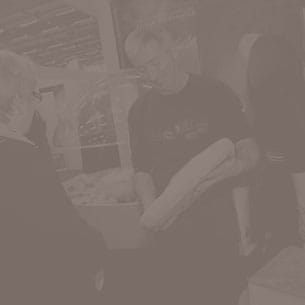
Is the cheesemonger business for you?
Recent developments in the profession
The cheesemonger profession still has a strong appeal. This has even grown sharply in recent years, since two-thirds of cheesemonger businesses did not exist 10 years ago.
The pandemic has not slowed down the growing attractiveness of the profession, on the contrary. Many people reflected on their life and career plans during that time, and some of them took the plunge, switching to the cheesemonger trade.
Today, more than 50% of cheesemonger managers come from professional retraining.
There are now 3,200 companies, with 3,600 points of sale. The panorama of these outlets has also changed: 55% of cheesemonger businesses in shops and 45% on markets. Around 10 years ago, those figures were reversed.
Other sales methods are growing; there is a growth in mobile businesses that move from village to village. This type of business had disappeared but, new projects are emerging in the wake of the recent health crisis. These are meaningful, local projects.
Because above all else, this trade is about direct contact.
More and more consumers are heading to the cheesemongers: about 30% of consumers in fact. They come to ask for advice and expect a level of expertise from their cheesemonger about the different varieties, the amount of ageing or the production methods.
The cheesemonger therefore has a pivotal role to play between the agricultural world and consumers as he or she passes on information and develops virtuous circles that nourish French culture - and enable it to be exported internationally.
The cheesemonger's qualities
The profession is very balanced between male and female cheesemongers. Only one quality is a must to enter the profession: a love of cheese.
You also must know how to make the connection with the agricultural world: to be familiar with the manufacturing techniques as well as the French terroirs. The key to success is product knowledge, combined with the desire to be an ambassador.
The cheesemonger's trade is about sales and personal contact. It is undergoing a shift from simple sales to sales-advice: the cheesemonger is a prescriber, guiding consumers towards the products they are looking for. It is not just a matter of informing them, it is also possible to influence their choices.
This is why caring about proximity, about contact with the consumer, is necessary to do the job properly.
Before you start out, bear in mind that this is a demanding job. There are long working days, including weekends, or at least Saturdays plus Sunday mornings. The hours can make family life complicated.
How to train as a cheesemonger?
How has training for the trade evolved?
The cheesemonger profession is an old one. It has its origins in the 19th century when it was closer to the grocery and retail trade than it is now. Cheesemongers had to adapt to the arrival of the supermarket, and many folded.
The profession is not restrictive in terms of professional qualifications: no diploma is required, unlike for bakers or butchers, for example. However, it is still essential to take the time to train before starting out!
There are many techniques to learn, as well as hygiene standards. Vocational training and work experience are fundamental.
Since the beginning of the 2000s, the range of training for the cheesemaker profession has expanded:
- 2000: Cheesemongers are included in the Meilleur Ouvrier de France (Best French Craftsperson) competition
- 2002: Creation of the CPQ (Certificate of Professional Qualification) for the cheesemonger trade
- 2015: Cheesemongers are included in the artisanal sector
- 2018: Creation of the CAP (Certificate of Professional Aptitude vocational qualification) for the cheesemonger profession
What training courses are available?
There are three types of training: the CQP and the CAP, which are medium to long-term courses, and the CFPL which has a shorter duration.
The CQP is a one-year sandwich (work-study) course. The trainee is employed by a cheesemonger business and receives more than 400 hours of training, covering all the different skills of the trade.
The public education system’s CAP offers a similar pathway. Open to young people from the age of 16 who have at least passed the brevet, as well as to adults for vocational retraining, the CAP is the most common diploma for becoming a cheesemonger
These two courses require a similar amount of time and neither of them is an entrepreneurial course per se. They are oriented towards the sales/advice aspect.
One significant difference is in the teaching approach. The CQP is more "vertical", i.e. it goes into more depth on product knowledge. The CAP is more "horizontal": it goes into less depth on product knowledge and focuses a little more on restaurant and cheese service. In addition, the CAP can be taken as an external candidate.
Another significant difference between the two courses is that if you hold a CAP and register your business with the Chambre des Métiers (Chamber of Trade & Industry), you will immediately be recognised as an artisan (craftsperson). With a CQP, on the other hand, you will have to wait 3 years before you can claim to be an artisan.
The CFPL is a short training course for professionals who do not have the time to follow a one-year training course. The Centre de Formation des Produits Laitiers is the French Cheesemongers Federation’s in-house dairy products training centre.
Over 91 hours, the CFPL provides training in the fundamentals of the profession, which can then be reinforced 'on-the-job'.
What funding is available for training?
The CAP and CQP are sandwich courses, enabling you to be employed by a cheesemonger business and to earn the minimum wage. The cost of the training is covered by the business. In addition, both are eligible for funding under the CPF (Individual Training Account) scheme in France.
Short courses, on the other hand, are not eligible for CPF funding: only cross-disciplinary courses related to business creation are eligible, not those to do with vocational training.
However, it is possible to apply for funding: job seekers are often potential trainees, and they can apply to Pôle Emploi (French Job Centre). The short course costs €4,400 and funding is considered on a case-by-case basis.
The Federation of French Cheesemakers
La Fédération des Fromagers de France - the Federation of French Cheesemongers, supporting the professions
The FFF is the reference in the cheesemonger profession. It represents the 3,200 French retail cheesemongers in shops or on markets and is embodied in the different regions by its 13 unions or delegations.
Its missions:
- Group and promote
- Unite the profession
- Contribute to the development of the profession
The Federation brings professionals together and promotes the profession, representing it in dealings with public authorities and various organisations, particularly at the level of the French dairy industry (CNIEL).
It actively contributes to the development of training by carrying out projects for the recognition of the cheesemonger profession. This is how the FFF helped to get the trade recognised by the artisanal sector in 2015.
The Federation's regional representatives are working professionals who act as a link between the Federation and the companies, creating a real network. The cheesemonger profession is very open and requires its members to discuss how the profession is moving forward. It is also essential that information circulates between the Federation and the professionals.
What services does the FFF offer?
The FFF's services, financed by members through a subscription system, are aimed at helping those who have a project to be better equipped to bring it to fruition.
- Creating content to help professionals develop their business: publication of studies, technical guides to help professionals, but also economic panoramas to provide a snapshot of the profession, or a guide for designing a point of sale, and to better understand the manufacture of cheeses and changing trends.
- Protecting businesses: the federation provides a legal service to inform members about legal issues, good hygiene practices in the profession or labelling in line with standards, as well as the many regulations. A collective agreement for these professions was published on 1 January 2022.
- Informing members: the dedicated website features the studies that have been published, but also provides a newsletter every fortnight and news updates as soon as there are aspects that merit attention. A newspaper is published every 3 months.
The Fédération des Fromagers de France strives to provide visibility for the cheesemonger profession through its presence at trade shows in France and abroad.

Your profile EXHIBITOR





